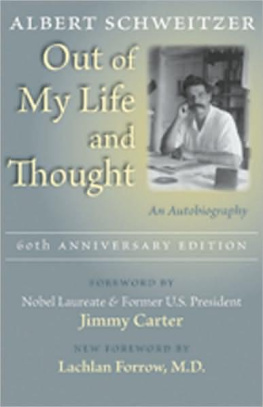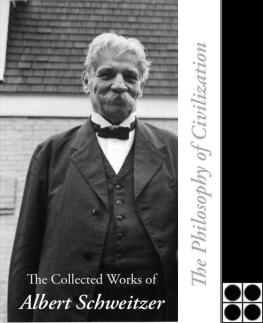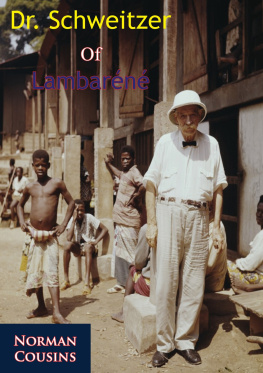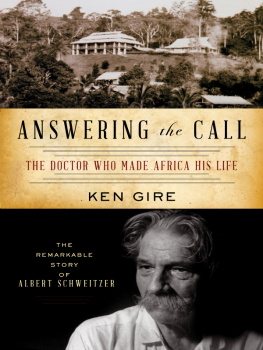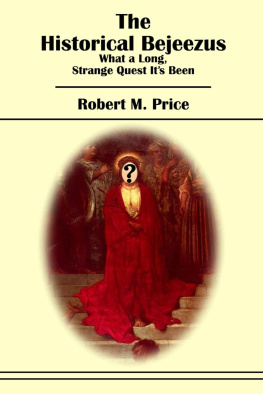Albert Schweitzer - On The Edge Of The Primeval Forest
Here you can read online Albert Schweitzer - On The Edge Of The Primeval Forest full text of the book (entire story) in english for free. Download pdf and epub, get meaning, cover and reviews about this ebook. year: 1924, publisher: A. C. BLACK, Ltd., genre: Detective and thriller. Description of the work, (preface) as well as reviews are available. Best literature library LitArk.com created for fans of good reading and offers a wide selection of genres:
Romance novel
Science fiction
Adventure
Detective
Science
History
Home and family
Prose
Art
Politics
Computer
Non-fiction
Religion
Business
Children
Humor
Choose a favorite category and find really read worthwhile books. Enjoy immersion in the world of imagination, feel the emotions of the characters or learn something new for yourself, make an fascinating discovery.

- Book:On The Edge Of The Primeval Forest
- Author:
- Publisher:A. C. BLACK, Ltd.
- Genre:
- Year:1924
- Rating:3 / 5
- Favourites:Add to favourites
- Your mark:
- 60
- 1
- 2
- 3
- 4
- 5
On The Edge Of The Primeval Forest: summary, description and annotation
We offer to read an annotation, description, summary or preface (depends on what the author of the book "On The Edge Of The Primeval Forest" wrote himself). If you haven't found the necessary information about the book — write in the comments, we will try to find it.
On The Edge Of The Primeval Forest — read online for free the complete book (whole text) full work
Below is the text of the book, divided by pages. System saving the place of the last page read, allows you to conveniently read the book "On The Edge Of The Primeval Forest" online for free, without having to search again every time where you left off. Put a bookmark, and you can go to the page where you finished reading at any time.
Font size:
Interval:
Bookmark:




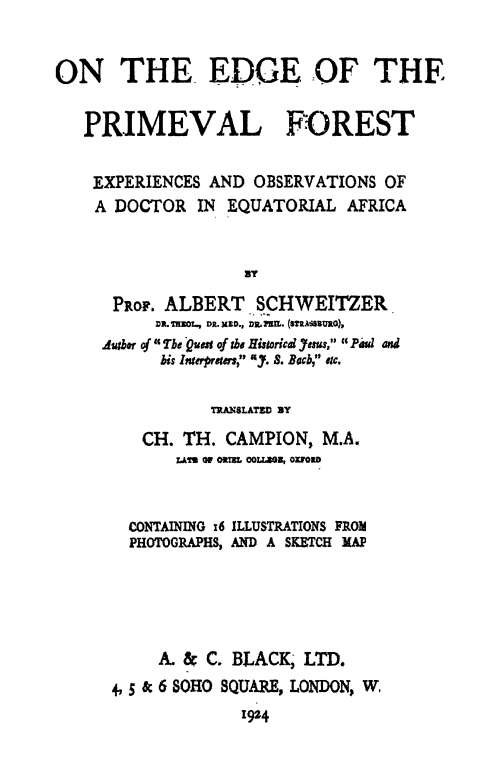
DEDICATION
To the friendsdead and livingwho have helped me in the enterprise of which this book is a part, in deepest gratitude.
NOTE
With regard to the English Edition of this book I owe a debt of thanks to two friends. Mr. Ch. Th. Campion, M.A., now of Grahamstown, S. Africa, had the goodness to prepare and to put at tny disposal his very excellent translation, and Mr. John Naish. of Oxford, was kind enough to revise the proofs and to undertake the final corrections.
First published, January igth, Reprinted, April, 1922, January, 1923, and February, 1924.
IN GRJBA.T BRITAIN BY THE WRTTSFKURS PRESS, LTD., J.OXDON AND TOSEHIDGI.
CONTENTS
:HAP. PAGE I. HOW I CAME TO BE A DOCTOR IN THE FOREST.
THE LAND AND PEOPLE OF THE OGOWE . I
II. THE JOURNEY IO
III. FIRST IMPRESSIONS AND EXPERIENCES . 29
IV. JULY, 1913JANUARY, 1914 39 V. JANUARY TO JUNE, 1914 ... 69
VI. LUMBERMEN AND RAFTSMEN IN THE
PRIMEVAL FOREST ... * 94
VII. SOCIAL PROBLEMS IN THE FOREST * * III
VIII. CHRISTMAS, 1914... 136
'-?
IX* CHRISTMAS, 1915 142
X. THE MISSION .....* 153
no.
1. LUMBERMEN AND TIMBER-RAFTS AT THE
MOUTH OF THE OGOWE .. Frontispiece
FACING FAGS
2. A RIVER STEAMER ON THE OGOWE .. 21
3. THE DOCTOR'S LITTLE BUNGALOW (DISTANT
VIEW) 28
4. THE DOCTOR'S LITTLE BUNGALOW (NEAR
VIEW) 28
5. THE HOSPITAL AT LAMBARENE ... 62
6. JOSEPH, THE HOSPITAL ASSISTANT, BANDAGING
SORES IN FRONT OF THE HOSPITAL .. 76
7. NEGRO CHILD WITH ABDOMINAL DROPSY . 76
8. PAHOUIN BOYS FROM LAMBARENE .. 88
9. STUMP OF A MAHOGANY TREE... Iqi
10. RAFT OF OKOUME WOOD AND MAHOGANY
BEING FLOATED DOWN THE OGOWE RIVER 104
11. PREMISES OF A TIMBER MERCHANT AT
LAMBARENE ...... Io8
12. A LITTLE PLANTATION OF BANANAS ON THE
MARGIN OF THE UNTOUCHED FOREST . 112
13. NEGRO VILLAGE AT LAMBARENE .. I2O
14. ON THE BANK OF THE OGOWE RIVEfc . , 136
15. A MISSIONARY'S BUNGALOW AT LAMBARENE * 149
16. THE BOYS' SCHOOL AT LAMBARENE . , 156
Note. I am indebted for a large part of the photographs to the kindness of a grateful patient. Illustrations Nos. 5 and 6 are based on a slide made by Mr. Ottznann* For illustration No. 3 I have to thank Mr. Pelot, and for Nos. 4 and 15 Mr. Morel.

ON THE EDGE OF THE PRIMEVAL FOREST
CHAPTER I
HOW I CAME TO BE A DOCTOR IN THE FOREST. THE LAND AND PEOPLE OF THE OGOWE
I GAVE up my position of professor in the University 3i Strasbourg, my literary work, and my organ-playing, in order to go as a doctor to Equatorial Africa. Eow did that come about ?
I had read about the physical miseries of the natives in the'virgin forests; I had heard about them from missionaries, and the more I thought about it the stranger it seemed to me that we Europeans trouble ourselves so little about the great humanitarian task which offers itself to us in far-off lands, ; The parable of Dives and Lazarus seemed to me to. have been spoken directly of us! We are Dives, for, through the advances of medical science, we now know, a great deal about disease and pain, and have innumerable means of fighting them,: yet we take as a matter of course the incalculable advantages which this new wealth gives us I Out there in the colonies, however, sits wretched Lazarus, the coloured folk, who suffers from illness
2 I. HOW I CAME TO BE A DOCTOR IN THE FOREST
and pain just as much as we do, nay, much more, and has absolutely no means of fighting them. And just as Dives sinned against the poor man at his gate because fpr want of thought he never put himself in his place and let his heart and conscience tell him what he ought to do, so do we sin against the poor man at our gate.
The two or three hundred doctors whom the European States maintain as medical officers in the colonial world could undertake only a very small part (so I argued to myself) of the huge task, even if the 'majority of them were not'there for the benefit, first of all, of the white coonists and the troops. Society in general must recognise this work of humanity to be its tstsk, and there must come a time when doctors go out into the world of their own free will, but sent and supported by society and in numbers corresponding to the need, to work for the benefit of the natives. Then only shall we be recognising and beginning to act upon the responsibility in respect of the coloured races which lies upon us as inheritors of tlfe world's dvilisation.
Moved by these thoughts I resolved, when already thirty years old, to study medicine and to put my ideas to the test out there. At the beginning of 1913 1 graduated as M.D. That same spring I started with my wife, who had qualified as a nurse, for the River Ogowe in Equatorial Africa, there to begin my active work.
I chose this locality because some Alsatian missionaries in the service of the Paris Evangelical Mission
had told me that a doctor was badly needed there on account of the constantly spreading sleeping sickness. The mission was prepared alsoto place at my disposal one of the houses at their station at Lambarene, and to allow me to build a hospital in their grounds, promising further to give me help with the work.
The actual expenses of the undertaking, however, I had to provide myself, and to that I devoted what I had earned by giving organ concerts, together with the profits from my book on Bach, which had appeared in German, French, and English. In this way the old Thomas Cantor of Leipsig, Johann Sebastian himself, helped me in the provision of a hospital for negroes in the virgin forest, and kind friends in Germany, France, and Switzerland contributed money. When we left Europe, the undertaking was securely financed for two years, the expensesapart from the journey out and back-being, as I reckoned, about 15,000 francs* a year, and this calculation proved to be very nearly correct.
The keeping of the accounts and the ordering of all the things needed had been undertaken by self-sacrificing friends in Strasbourg, and the cases, when packed, were sent to Africa by the mission with their own.
My work then lived & use a scientific termin symbiosis with the Paris Evangelical Mission, but it was, in itsdf, undenominational and international. It was, and is still, my conviction that the humanitarian work to be done in the world should, for its accomplishment, call upon us as men, not as members of aav particular nation or religious body,
* !. about 600 p.a. at the then normal rate of exchange
ma,
4 I. HOW I CAME TO BE A DOCTOR IN THE FOREST
Now for a word about the country which was the scene of our labours. The Ogowe district belongs to the Colony of Gaboon,-and the Ogowe itself is a river, 700 to 800 miles long, north of, and roughly parallel to, the Congo. Although smaller than the latter, it is yet a magnificent river, and in the lower part of its course its width is from 1,200 to 2,200 yards. For the last 120 miles it divides into a number of arms which enter the Atlantic near Cape Lopez, but it is navigable for fairly large river steamers as far as N'DjSle, about 250 miles up stream. At that point begins the region of hills and mountains which leads up to the great plateau of Central Africa. Here also begins a series of rapids which alternate with stretches of ordinary open river, and these rapids can only be surmounted by small screw steamers, built for the purpose, and by native canoes.
Font size:
Interval:
Bookmark:
Similar books «On The Edge Of The Primeval Forest»
Look at similar books to On The Edge Of The Primeval Forest. We have selected literature similar in name and meaning in the hope of providing readers with more options to find new, interesting, not yet read works.
Discussion, reviews of the book On The Edge Of The Primeval Forest and just readers' own opinions. Leave your comments, write what you think about the work, its meaning or the main characters. Specify what exactly you liked and what you didn't like, and why you think so.


